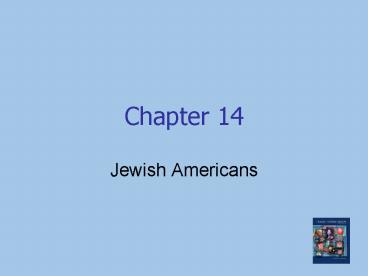Jewish Americans - PowerPoint PPT Presentation
1 / 31
Title:
Jewish Americans
Description:
to the United States ... First - United States government never ... Politics and the New Left. Politics and Israel. Religious Life. Orthodox: Conservative: ... – PowerPoint PPT presentation
Number of Views:841
Avg rating:3.0/5.0
Title: Jewish Americans
1
Chapter 14
- Jewish Americans
2
Jewish People Race, Religion or Ethnic Group?
- Jews are a subordinate group
- Unequal treatment
- Share a cultural history that distinguishes them
from the dominant group - Ascribed status or involuntary status
- Group solidarity
- In-group marriage
3
- Jewish identity among Jews is based on a shared
culture - thus Jews are best classified as an
ethnic minority - The trend in the United States among Jews has
been toward Judaization -lessening of the
significance of religion and an increase in
culture as the bond among Jews
4
Immigration of Jews to the United States
- First Jewish migration occurred around 1654 from
Spain and Portugal (Refugees) - Largest Jewish migration occurred around the end
of nineteenth century
5
- Immigration Act of 1920 reduced Jewish
immigration - Recent immigration has been from Israel, Soviet
Union and Iran
6
Population Figures
- U. S. has the largest Jewish population in the
world accounting for 46 of the worlds Jewish
population. - Nation with the second highest Jewish population,
Israel, is the only one in which Jews are in the
majority, accounting for 81 of the population. - Jewish population is highly urbanized (about 95
live in cities).
7
Are Jewish Americans a Subordinate Group?
- Yes, they fulfill the criteria
- 1. They experience unequal treatment
- 2. Jews share a cultural history that
distinguishes them from dominant group - 3. Jews have a strong sense of group
solidarity - 4. Jewish men women tend to marry one
another
8
Judaization
- Richard Schaeffer (2000) sees this as a trend -
the lessening importance of Judaism as a religion
and the substitution of cultural traditions as
the ties that bind Jews. - A Jew in contemporary America is an individual
who thinks of himself or herself as a Jew.
9
Figure 14-3 Intergroup Relations Continuum
10
Anti-Semitism Past and Present
- Origins of anti-Semitism
- Blamed for the crucifixion of Jesus Christ
- Formation of negative stereotypes over the years
- Fringe-of-values theory by Gordon Allport (1979)
and the formation of negative stereotypes
11
- Jewish group identity as a means of adapting to a
hostile environment and in-group virtues becoming
out-group vices - Discrimination as a source of anti-Semitism
12
Holocaust
- Holocaust - state-sponsored systematic
extermination of European Jews by Nazi Germany - German policy and the restriction of the rights
of Jews - Between 1933 - 1945 two-thirds of Europe's Jewish
population were killed
13
Unites States Anti-Semitism Past
- Colonial America and anti-Semitism
- Peter Stuyvesants attempt to expel Jews from
what is New York city today - The 1920s and 1930s saw an increase in anti-
Semitism
14
Unites States Anti-Semitism Past
- Perpetuation of false propaganda - In the forged
documents Protocols of the Elders of Zion - The publications of the Protocols and
anti-Semitism
15
Differences Between Anti-Semitism in the United
States and Europe
- First - United States government never promoted
anti-Semitic policies - Second - anti-Semitism was not institutionalized
in the United States - Third - Jews did not develop a defensive ideology
in order to survive
16
Contemporary Anti-Semitism
- Anti-Defamation League
- Monitors anti-Semitic incidents
- Rise in numbers in 1990s and 2001
- American Jews and the relationship with Israel
17
Contemporary Anti-Semitism
- Source of unity and identity
- Zionism - and anti-Semitism
- African Americans and Anti-Semitism
- Fewer anti-Semitic and more anti-White
institutions
18
Figure 14-4 Anti-Semitic Incidents, 1980-2002
19
Position of Jewish Americans
- Declining discrimination in the business world
- Jewish MBAs and job opportunities
- Rising rapidly up the corporate hierarchy
- Higher salaries
- Declining poverty and the invisible poor
20
Education
- Judaic religion and the emphasis on formal
schooling - Emphasis on education
- Higher educational attainment
- Prejudice at school
21
Organizational Activity
- United Jewish Appeal - founded in (1939) raises
funds for humanitarian causes - American Jewish Committee - founded in (1906) to
improve Jewish-Gentile relations
22
- American Jewish Congress - founded in (1918) to
improve Jewish-Gentile relations - Bnai Brith - founded in (1843) to promote
cultural programs (ADL)
23
Political Activity
- Jewish voters and the Democratic party
- Political offices
- Politics and the New Left
- Politics and Israel
24
Religious Life
- Orthodox
- Conservative
- Reconstructionist
- Reform
- Just Jewish
- 7
- 29
- 2
- 29
- 33
25
(No Transcript)
26
The Orthodox Tradition
- Orthodox tradition
- Torah
- Life is conducted according to tradition and
rituals - Kashrut - food
27
The Reform Tradition
- Very religious
- Changed traditions to reflect social changes
- Conservative Judaism in between Orthodox and
Reform
28
Jewish Identity
- Yiddishkait - Jewish Americans and a sense of
peoplehood (Jewishness) - Jewish women and Jewish identity
- Halakha
29
Family
- Delayed marriage
- Single life has become increasingly more
acceptable - Declining birth rate, acceptability of
childlessness and rising divorce rate - Decline in intergenerational roles in the family
- Decline in Jewishness in daily live
30
Figure 14-5 Generational Patterns by Denomination
31
Role of Religion
- Judaism and religious diversity
- Traditional Jewish Law
- Religion and marginality
- The role of culture
- Maintaining a sense of peoplehood





![Download Book [PDF] The Jewish Onslaught: Dispatches from the Wellesley Battlefront [PDF] PowerPoint PPT Presentation](https://s3.amazonaws.com/images.powershow.com/10112988.th0.jpg?_=20240830102)

























![READ⚡[PDF]✔ The Holocaust in American Life PowerPoint PPT Presentation](https://s3.amazonaws.com/images.powershow.com/10045190.th0.jpg?_=20240601079)